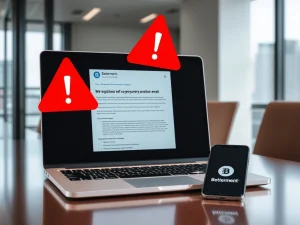Bitcoin News: Shocking 7-Year Sentence for $10M Cryptocurrency Fraud and Money Laundering

In a landmark case that has sent shockwaves through the cryptocurrency world, the founder of AML Bitcoin has been sentenced to seven years in prison for orchestrating a $10 million cryptocurrency fraud and money laundering scheme. This case marks a pivotal moment in the fight against crypto-related financial crimes.
Bitcoin News: The $10M Fraud Uncovered
The founder’s elaborate scheme involved manipulating digital wallets and exploiting loopholes in cryptocurrency exchanges to launder illicit funds. Key aspects of the operation included:
- Layered transactions to obscure fund origins
- Exploitation of blockchain anonymity
- Cross-border money laundering through multiple exchanges
Cryptocurrency Fraud: How Authorities Cracked the Case
Investigators used advanced forensic analysis of blockchain data combined with exchange records to trace the flow of funds. This case demonstrates:
| Challenge | Solution |
|---|---|
| Blockchain anonymity | Forensic chain analysis |
| Cross-border transactions | International cooperation |
| Complex fund movements | AI-powered tracking tools |
Money Laundering in Crypto: A Growing Concern
The case highlights the increasing sophistication of money laundering in the cryptocurrency space. Recent data shows:
- 35% increase in crypto money laundering cases since 2023
- Over $4 billion in crypto assets laundered annually
- Growing use of privacy coins and mixers
AML Bitcoin Case: Regulatory Implications
This sentencing sends a clear message to the crypto industry about compliance. Key takeaways:
- AML/KYC requirements are now mandatory
- Regulators are improving tracking capabilities
- Non-compliance risks severe penalties
Crypto Compliance: The Future of Regulation
The industry must adapt to increasing regulatory scrutiny. Essential steps include:
- Implementing robust transaction monitoring
- Conducting regular compliance audits
- Training staff on AML procedures
- Cooperating with international regulators
This landmark case represents a turning point for cryptocurrency regulation. As authorities demonstrate their ability to trace and prosecute complex crypto crimes, the industry must prioritize compliance to maintain legitimacy and public trust.
Frequently Asked Questions
What was the specific cryptocurrency fraud committed?
The founder manipulated digital wallets and exploited exchange loopholes to launder $10 million through layered transactions designed to obscure fund origins.
How did authorities trace the cryptocurrency transactions?
Investigators used forensic blockchain analysis combined with exchange records and international cooperation to follow the money trail across borders.
What does this case mean for cryptocurrency regulation?
It signals regulators’ growing ability to track crypto crimes and emphasizes that AML compliance is now mandatory, not optional, for crypto businesses.
How can crypto businesses protect themselves from similar issues?
By implementing robust AML/KYC procedures, transaction monitoring systems, and regular compliance audits to meet evolving regulatory standards.










